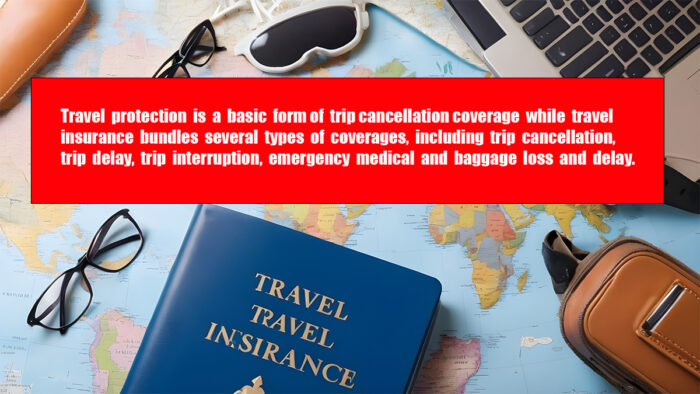It is imperative that individuals cease conflating travel protection with travel insurance. These misconceptions have brought about the birth of travel protection vs. travel insurance. What’s the difference? If you are still unsure about what both travel tools are, you are in the right place.

But first, before purchasing any of these plans as a traveler, it is important to understand the differences between them. When you do so, you will find it easy to decide whether it is protection or insurance you need for your trip. Even though they both hold value, there are still significant differences that you need to know about. So, let’s learn about that together.
What is Travel Protection?
Travel protection is an insurance product frequently sold by travel companies and agencies. Unlike travel insurance, travel protection is more limited and focuses more on trip cancellation. So, if you have planned a trip and end up canceling it, and you don’t have cancellation fees for hotels, flights, or other reservations, this is where travel protection comes in.
Some policies provide compensation for the full cost of your trip and allow you to reschedule it later.
What’s more, some travel protections offer coverage for trip interruption, and if your trip is disrupted for reasons mentioned in the policy, for instance, natural disasters or medical emergencies, your insurance company will reimburse you for the unused part of your trip.
What Does Travel Protection Cover?
When you have travel protection, you will receive coverage for some situations and incidents. For example:
- Trip cancellation.
- Flight delay.
- Trip interruption.
- Missed flights.
Besides, you can get travel protection at affordable prices, and thanks to this plan, you are covered against specific risks.
Why Buy It?
If you have had your trips canceled or interrupted in the past, I am sure you understand how annoying it can be. Moreover, if you do not get compensated for the unused portion of your trip, that is even worse. But with travel protection, you do not have to worry.
Besides, it pays more attention to trip interruptions and cancellations. In other words, you are getting coverage for these events. So, if anything ever happens and you have to cancel your trip or vacation or it gets interested, reimbursement awaits you with travel protection.
What is Travel Insurance?
Travel insurance is a comprehensive coverage type that protects policyholders financially and gives them rest of mind if or when an emergency or unforeseen circumstance arises. Different from travel protection, travel insurance offers coverage for trip cancellations and interruptions as well as a wide range of coverage options. For instance, medical bills.
Moreover, if you end up canceling your vacation or trip due to an unforeseeable situation, you are qualified for reimbursement or compensation. If you are interested in getting a policy, you can purchase it online or in person from an insurance company.
What Does Travel Insurance Cover?
The coverage options for travel insurance depend on the insurance company and other factors. Nevertheless, here is the basic coverage you get when you purchase a travel insurance policy:
- Travel or trip delay.
- Emergency medical evacuation.
- Trip cancellation.
- Baggage delay.
- Medical bills.
- Baggage loss.
- Personal injury.
- Natural disasters.
- The death of your traveling companion.
On the other hand, some comprehensive travel insurance quotes offer third-party liability coverage.
What Does It Not Cover?
This is another thing that your insurance provider determines. So, make sure that you go through the insurance agreement and coverage options to find out if you are okay with the exclusions. So, here is what travel insurance does not cover:
- Natural disasters before you bought the policy.
- Change of mind.
- Normal pregnancy.
- Bad weather.
- Foreseeable reasons.
- Fear of flying.
- Some last-minute changes.
- Medical tourism.
- Risky activities.
- Pre-existing medical conditions.
- Alcohol use.
- Dangerous and illegal activities.
As well, anything that is not mentioned or a part of your policy will not be covered by your insurance company.
Why Get a Policy?
With a travel insurance policy, you will be reimbursed for the money you lose because of an unpredictable event or incident before or during your departure. So, with a quote, you do not have to get worked up about financial losses and risks. Additionally, it offers a wide range of coverage to access once you become a policyholder.
Travel Protection vs. Travel Insurance: What’s the Difference?
The major difference between travel protection and travel insurance is that travel protection is recognized as a basic form of coverage, especially for tourists, and it is way cheaper than travel insurance and only offers trip cancellation coverage. On the other hand, travel insurance is a policy that offers wider, more comprehensive coverage. Some of the coverage you get with this type of policy includes flight cancellation, medical emergency evacuation, and baggage delays.
To repeat, there are significant and obvious differences between travel protection and travel insurance. So, to provide a well-detailed answer to the question of travel protection vs. travel insurance: what’s the difference?, a table has been prepared:
| Travel Protection | Travel Insurance | |
| Providers | Travel companies, tour operators, or travel agencies. | Insurance companies |
| Coverage | -Trip interruption. -Missed flight. -Trip cancellation. -Flight delay. | – Travel or trip delay. -Emergency medical evacuation. – Personal injury. – Death of your traveling companion. – Medical bills. – Baggage delay. – Natural disasters. – Baggage loss. -Trip cancellation. |
| Emergency Services | Doesn’t offer emergency services. | Offers emergency services |
| Cost | It depends on the benefits it provides and the type of coverage you are looking for. | It depends on the insurance company and other factors. It is also more expensive than a travel protection plan. |
With the details from this table, you have a clearer understanding of how travel protection and travel insurance work.



